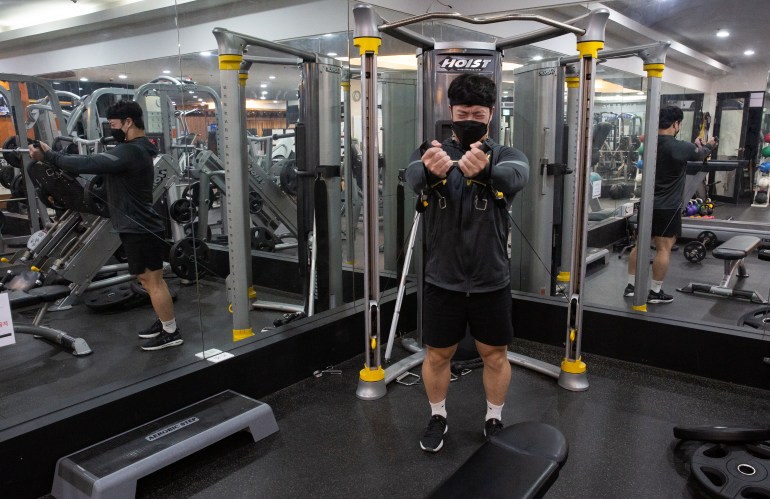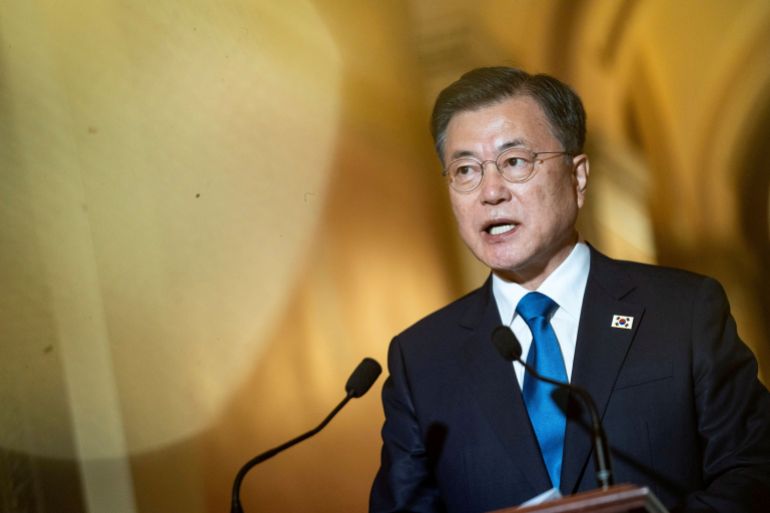Drowning in debt, South Korean businesses revolt over COVID rules | Business and Economy
Incheon, South Korea – A few days before the end of 2021, Shin uploaded a video on YouTube. The owner of a pub in the city of Uijeongbu, on the northern edge of Seoul, had a bold idea for New Year’s Eve.
“On this December 31, I am going to livestream my pub doing business as usual from 9pm until 5am,” he said in the video.
“Which means that I am going to defy the government restriction.”
In mid-December, the South Korean government reimposed a business curfew as COVID-19 cases surged to record highs across the country. Restaurants and bars must close after 9pm. Violators face fines or the suspension of their business.
Although South Korea has avoided the sweeping business closures and stay-at-home orders seen in other countries during the pandemic, the restrictions on business hours have hit small businesses hard.
Shin, who asked to only be identified by his last name, was not the first to announce his intention to defy the curfew.
A café chain stirred controversy when it announced days earlier that it would defy the rules, citing the financial hardship inflicted by a previous months-long curfew introduced in July.
Shin told Al Jazeera he felt inspired when he heard the news.
“What they did set my heart ablaze,” he said. “And I wanted to do the same for other business owners.”
Shin, who co-owns about a dozen hospitality venues in Uijeongbu and the nearby coastal city of Incheon, said his businesses had racked up about 1.3 billion won ($1.1m) in losses during the past two years.
“I, for one, have about 600 million in debt, counting only that incurred by the restriction alone,” he said.
 Gyms have been among the businesses hardest hit by South Korea’s pandemic restrictions [File: Jeon Heon-Kyun/ EPA-EFA]
Gyms have been among the businesses hardest hit by South Korea’s pandemic restrictions [File: Jeon Heon-Kyun/ EPA-EFA]Bars and restaurants aren’t the only businesses to have suffered. Indoor sports facilities such as the gym Oh Sung-young runs in Pocheon, a city northeast of Seoul, have been among the biggest losers of the government’s pandemic policies.
“I expected at least a handful of new members but none so far,” Oh told Al Jazeera, referring to business in the new year. “Only two or three membership extensions.”
Gyms are among the few businesses that have been ordered to temporarily cease operations completely, with an initial shutdown order in March 2020 followed by two more rounds of closures.
The return of the curfew, which also requires gyms to close by 9pm, has led many of Oh’s customers to suspend or cancel their membership, cutting his revenue in half.
“Adults with a regular job usually go to a gym around 8pm after work,” Oh said. “They simply don’t have time to wash themselves off after working out.”
Overall, South Korea’s economy has weathered the pandemic well compared with many of its peers, while authorities have reported fewer than 6,000 deaths.
“Among the major developed economies, [ours] has recovered to the pre-COVID level at the fastest pace,” President Moon Jae-in said in an address to the National Assembly in October. “The average growth rate of the last two years has been higher [than the G7 nations].”
‘Weak consumption’
That growth, however, has been far from uniform across industries. While conglomerates like Samsung and Hyundai achieved record exports, many smaller businesses saw revenues plummet.
While South Korea’s top 100 firms saw profits sink 2.5 percent in 2020 compared with the previous year, small businesses’ profits plummeted 43 percent, according to the national statistics office. The arts, sports and leisure sectors took the biggest hit, with profits plunging 85.2 percent compared with the previous year.
That uneven picture risks holding back the wider economy.
“The polarisation in the labor market and household income reduces consumption,” Lee Seung-hun of KB Research said in a report. “Weak consumption will hinder the growth of the Korean economy.”
Noh Min-sun, a research fellow at the Korea Small Business Institute, said in a report the government could be tempted to tighten fiscal policy out of concern for inflation despite the effects of the latest restrictions.
“The government needs to ensure that the small businesses that were cooperative during the pandemic measures will get enough compensation,” Noh said.
Many business owners complain the government’s support measures have gone nowhere near far enough.
“My businesses have received compensation of up to 20 million won ($16,700) each,” Shin said. “But what help could it give me when one venue costs 12 million a month in rent?”
 South Korean President Moon Jae-in has hailed the country’s pandemic response for achieving better economic outcomes than other countries [Jabin Botsford/ Reuters]
South Korean President Moon Jae-in has hailed the country’s pandemic response for achieving better economic outcomes than other countries [Jabin Botsford/ Reuters]Oh said he had received about 10 million won in compensation during the last two years, barely enough to cover his monthly operating costs.
According to the government’s guidelines, a business that lost 14 million won in revenue last year compared with 2019 is entitled to less than 4 million won in compensation.
Critics say the government has been reluctant to provide as generous support as other countries.
While economies such as Germany and Japan have rolled out support equivalent to more than 15 percent of gross domestic product (GDP), South Korea’s spending has amounted to 6.4 percent of GDP, according to International Monetary Fund statistics.
Swelling household debt has been one of the consequences. Last month, the Bank of Korea noted that the private sector, especially households, had led a rapid expansion of debt during the pandemic, unlike in other major economies where government spending led the charge.
After peaking at almost 8,000 cases in mid-December, South Korea’s latest wave seems to be largely under control.
Nevertheless, officials say it remains to be seen whether restrictions will be extended when the current round ends on January 16, even though the country’s double-vaccination rate of 82 percent is among the highest in the world.
Meanwhile, business owners’ sense of desperation grows.
Despite mounting debts, Oh has applied for yet another loan.
“There was nothing I could do but keep piling up debts because if I quit now, I’ve got nowhere else to go,” he said. “I just hope the pandemic will be over soon.”
Anger, too, is rising. In recent weeks, hundreds of small business owners have rallied in Seoul to protest the restrictions.
Shin ultimately did not stage his small rebellion on New Year’s Eve but is planning to make his voice heard soon – only this time, he won’t be alone.
“I got a lot of calls from different business owners’ organisations,” he said. “One of them asked me not to do it this time. They said they are coordinating their actions and asked me to join them when the time is right.”

Pingback: สล็อตเว็บตรง อัพเดทใหม่ล่าสุด โบนัสแตกยับ
Pingback: เว็บสล็อต แตกหนัก รวมเกมทุกค่าย วางใจได้100%
Pingback: mostbet aplikace